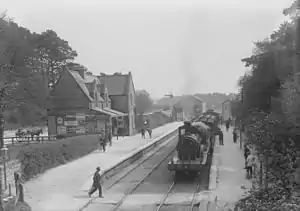| GS&WR 52 & 60 Classes | |||||||||||||||||||||||||||
|---|---|---|---|---|---|---|---|---|---|---|---|---|---|---|---|---|---|---|---|---|---|---|---|---|---|---|---|
 No. 60 at Abbeyleix 1909 | |||||||||||||||||||||||||||
| |||||||||||||||||||||||||||
| |||||||||||||||||||||||||||
| |||||||||||||||||||||||||||
| |||||||||||||||||||||||||||
| Details for Class 52 as built[1]: 67–72 | |||||||||||||||||||||||||||
The Great Southern and Western Railway (GS&WR) Class 52 consisted of twenty 4-4-0 express passenger tender locomotives designed by John Aspinall. Aspinall also built a further fifteen similar but slightly larger locomotives of GS&WR Class 60.[1]: 67–72
The locomotives were built soon after Aspinall took up his post, and were to an extent a derivation of an Alexander McDonnell 2-4-0 design incorporating the same boiler but having a leading bogie.[2]: 148–150
Improved Class 60
The Class 60 was a more powerful evolution of Class 52, being slightly heavier and having an increased tractive effort.[3]
Service
The GSR Class 52 was initially deployed on fast express main-line services, and were almost immediately displayed to more secondary duties by the GS&WR Class 60.[1] The arrival of the GS&WR Class 301 and later more powerful locomotives seen them all displaced to secondary routes. They were even known to work Dublin to Bray suburban services on very rare occasions despite their large diameter wheels being less suitable for fast acceleration.[3]
References
- 1 2 3 Clements, Jeremy; McMahon, Michael (2008). Locomotives of the GSR. Colourpoint Books. ISBN 9781906578268.
- ↑ Murray, K. A.; McNeil, D.B. (1976). The Great Southern & Western Railway. Irish Record Railway Society. ISBN 0904078051.
- 1 2 Boocock, Colin (1 October 2009). "Locomotive Compendium Ireland" (1st ed.). Ian Allan. p. 15. ISBN 9780711033603.